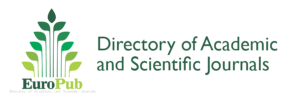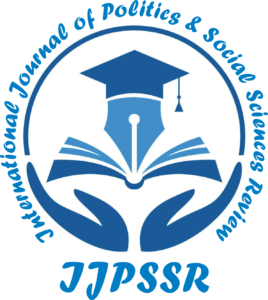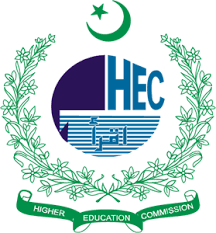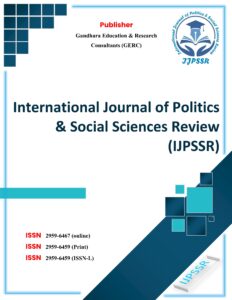Publication Policy Agreement
The publication of an article in a peer-reviewed journal “International Journal of Politics & Social Sciences Review (IJPSSR)” is an essential building block in the development of a coherent and respected network of knowledge. It is a direct reflection of the quality of the work of the authors and the institutions that support them. Peer-reviewed articles support and embody the scientific method. It is therefore important to agree upon standards of expected ethical behavior for all parties involved in the act of publishing: the author, the editor of the journal, the peer reviewer, the publisher, and the society.
IJPSSR takes its duties of guardianship over all stages of publishing extremely seriously and recognize ethical and other responsibilities. IJPSSR are committed to ensuring that advertising, reprint, or other commercial revenue has no impact or influence on editorial decisions. Besides, Editorial Board will assist in communications with other journals and/or publishers where this is useful and necessary.
Duties of Authors
Reporting Standards
Authors of reports of original research should present an accurate account of the work performed as well as an objective discussion of its significance. Underlying data should be represented accurately in the paper. A paper should contain sufficient detail and references to permit others to replicate the work. Fraudulent or knowingly inaccurate statements constitute unethical behavior are unacceptable. Review and professional publication articles should also be accurate and objective.
Data Access and Retention
Authors may be asked to provide the raw data in connection with a paper for editorial review, and should be prepared to provide public access to such data, if practicable, and should, in any event, be prepared to retain such data for a reasonable time after publication.
Originality and Plagiarism
The authors should ensure that they have written entirely original works, and if the authors have used the work and/or words of others, that this has been appropriately cited or quoted. Plagiarism takes many forms, from passing off another paper as the authors own paper, to copying or paraphrasing substantial parts of another paper (without attribution), to claiming results from research conducted by others. Plagiarism in all its forms constitutes unethical publishing behavior and is unacceptable in IJPSSR.
Multiple, Redundant or Concurrent Publication
An author should not in general publish manuscripts describing essentially the same research in more than one journal or primary publication. Submitting the same manuscript to more than one journal concurrently constitutes unethical publishing behavior and is unacceptable. In general, an author should not submit for consideration in another journal a previously published paper. Publication of some kinds of articles in more than one journal is sometimes justifiable, provided certain conditions are met. The authors and editors of the journals concerned must agree to the secondary publication, which must reflect the same data and interpretation of the primary document. The primary reference must be cited in the secondary publication.
Acknowledgment of Sources
Proper acknowledgment of the work of others must always be given. Authors should cite publications that have been influential in determining the nature of the reported work. Information obtained privately, as in conversation, correspondence, or discussion with third parties, must not be used or reported without explicit, written permission from the source. Information obtained in the course of confidential services, such as refereeing manuscripts or grant applications, must not be used without the explicit written permission of the author of the work involved in these services.
Authorship of the Paper
Authorship should be limited to those who have made a significant contribution to the conception, design, execution, or interpretation of the reported study. All those who have made significant contributions should be listed as co-authors.
Where others have participated in certain substantive aspects of the research project, they should be acknowledged or listed as contributors. The corresponding author should ensure that all appropriate co-authors and no inappropriate co-authors are included on the paper and that all co-authors have seen and approved the final version of the paper and have agreed to its submission for publication.
Disclosure and Conflicts of Interest
All authors should disclose in their manuscript any financial or another substantive conflict of interest that might be construed to influence the results or interpretation of their manuscript. All sources of financial support for the project should be disclosed. Examples of potential conflicts of interest that should be disclosed include employment, consultancies, stock ownership, honoraria, paid expert testimony, patent applications/registrations, and grants or other funding. Potential conflicts of interest should be disclosed at the earliest stage possible.
Fundamental Errors in Published Works
When an author discovers a significant error or inaccuracy in his/her published work, the author must promptly notify the journal editor or publisher and cooperate with the editor to retract or correct the paper. If the editor or the publisher learns from a third party that a published work contains a significant error, the author must promptly retract or correct the paper or provide evidence to the editor of the correctness of the original paper.
Duties of the Editorial Board
These guidelines are based on existing IJPSSR policies and COPE Best Practice Guidelines for Journal Editors.
Publication Decisions
The editor of a peer-reviewed journal IJPSSR is responsible for deciding which of the articles submitted to the journal should be published. The validation of the work in question and its importance to researchers and readers must always drive such decisions. The editor may be guided by the policies of the journal’s editorial board and constrained by such legal requirements as shall then be in force regarding libel, copyright infringement and plagiarism. The editor may confer with other editors or reviewers in making this decision.
Fair Play
An editor should evaluate manuscripts for their intellectual content without regard to race, gender, sexual orientation, religious belief, ethnic origin, citizenship, or political philosophy of the authors.
Confidentiality
The editor and any editorial staff must not disclose any information about a submitted manuscript to anyone other than the corresponding author, reviewers, potential reviewers, other editorial advisers, and the publisher, as appropriate.
Disclosure and Conflicts of Interest
Unpublished materials disclosed in a submitted manuscript must not be used in an editor’s research without the express written consent of the author. Privileged information or ideas obtained through peer review must be kept confidential and not used for personal advantage. Editors should recuse themselves (i.e. should ask a co-editor, associate editor or another member of the editorial board instead to review and consider) from considering manuscripts in which they have conflicts of interest resulting from competitive, collaborative, or other relationships or connections with any of the authors, companies, or (possibly) institutions connected to the papers. Editors should require all contributors to disclose relevant competing interests and publish corrections if competing interests are revealed after publication. If needed, other appropriate action should be taken, such as the publication of a retraction or expression of concern.
Involvement and Cooperation in Investigations
An editor should take reasonably responsive measures when ethical complaints have been presented concerning a submitted manuscript or published paper, in conjunction with the publisher (or society). Such measures will generally include contacting the author of the manuscript or paper and giving due consideration of the respective complaint or claims made, but may also include further communications to the relevant institutions and research bodies, and if the complaint is upheld, the publication of a correction, retraction, expression of concern, or other note, as may be relevant. Every reported act of unethical publishing behavior must be looked into, even if it is discovered years after publication.
Duties of Reviewers
These guidelines are based on existing IJPSSR policies and COPE Best Practice Guidelines for Journal Editors.
Contribution to Editorial Decisions
Peer review assists the editor in making editorial decisions and through the editorial communications with the author may also assist the author in improving the paper. Peer review is an essential component of formal scholarly communication, and lies at the heart of the scientific method. Elsevier shares the view of many that all scholars who wish to contribute to publications must do a fair share of reviewing.
Promptness
Any selected referee who feels unqualified to review the research reported in a manuscript or knows that its prompt review will be impossible should notify the editor and excuse himself from the review process.
Confidentiality
Any manuscripts received for review must be treated as confidential documents. They must not be shown to or discussed with others except as authorized by the editor.
Standards of Objectivity
Reviews should be conducted objectively. Personal criticism of the author is inappropriate. Referees should express their views clearly with supporting arguments.
Acknowledgment of Sources
Reviewers should identify relevant published work that has not been cited by the authors. Any statement that an observation, derivation, or argument had been previously reported should be accompanied by the relevant citation. A reviewer should also call to the editor’s attention any substantial similarity or overlap between the manuscript under consideration and any other published paper of which they have personal knowledge.
Disclosure and Conflict of Interest
Unpublished materials disclosed in a submitted manuscript must not be used in a reviewers own research without the express written consent of the author. Privileged information or ideas obtained through peer review must be kept confidential and not used for personal advantage. Reviewers should not consider manuscripts in which they have conflicts of interest resulting from competitive, collaborative, or other relationships or connections with any of the authors, companies, or institutions connected to the papers.
Copyright
- All work published by IJPSSR is protected by international copyright laws.
- All the articles published in IJPSSR are open accessed articles published and distributed under the Creative Commons Attribution-Non commercial 4.0 International License which allows:
- Reproduction,
- Distribution,
- Derives and
- Non-Commercial use, provided the original work, is properly cited and authors and publisher are properly identified.
- IJPSSR allows the authors to retain copyright under the CC BY NC license.
- IJPSSR is licensed under https://creativecommons.org/licenses/by-nc/4.0/
Format Rules
IJPSSR follows APA (American Psychological Association). See the submission guideline and booklet for the authors.
Disclosure of Interest Policy
As an international journal IJPSSR intended to facilitate the worldwide exchange of theory in different fields of social sciences and encourages contributions from different educational systems and cultures around the world. Therefore, any details that would make the reliability and validity of the research doubtful due to conflict of interest must be included in the following format with the original submission at the time of publication:
I have no potential/ latent/ covert conflict of interest about this submission to IJPSSR.
I agree with all the above-mentioned terms and conditions of the IJPSSR Publishing Policy Agreement and Accept that the decision of IJPSSR will be final and I will have no objection.
Principal Author’s Signature ________________________
Co-Authors’ Signatures (if any) 1. ________________________ 2. ________________________
Indexed by
















